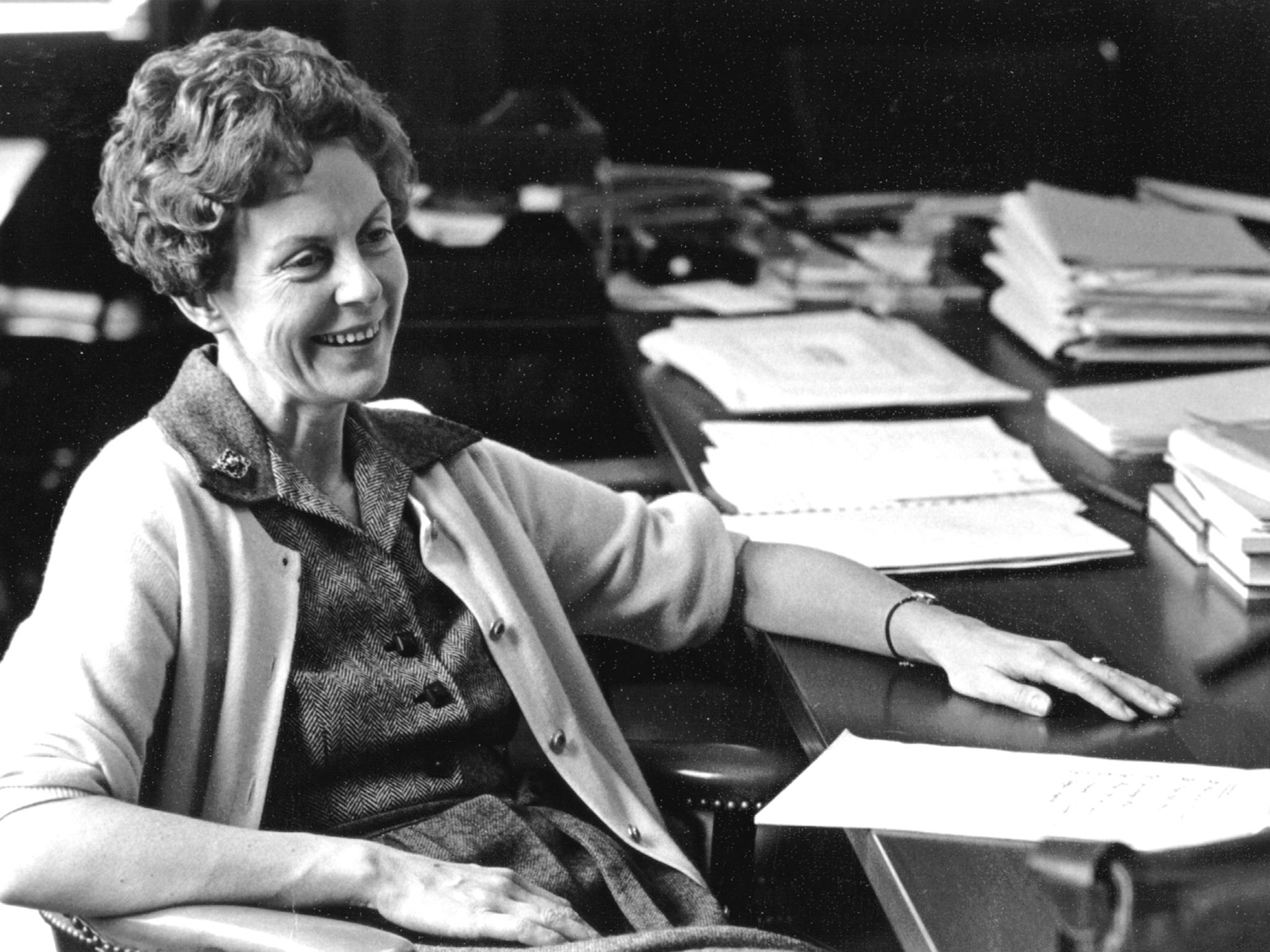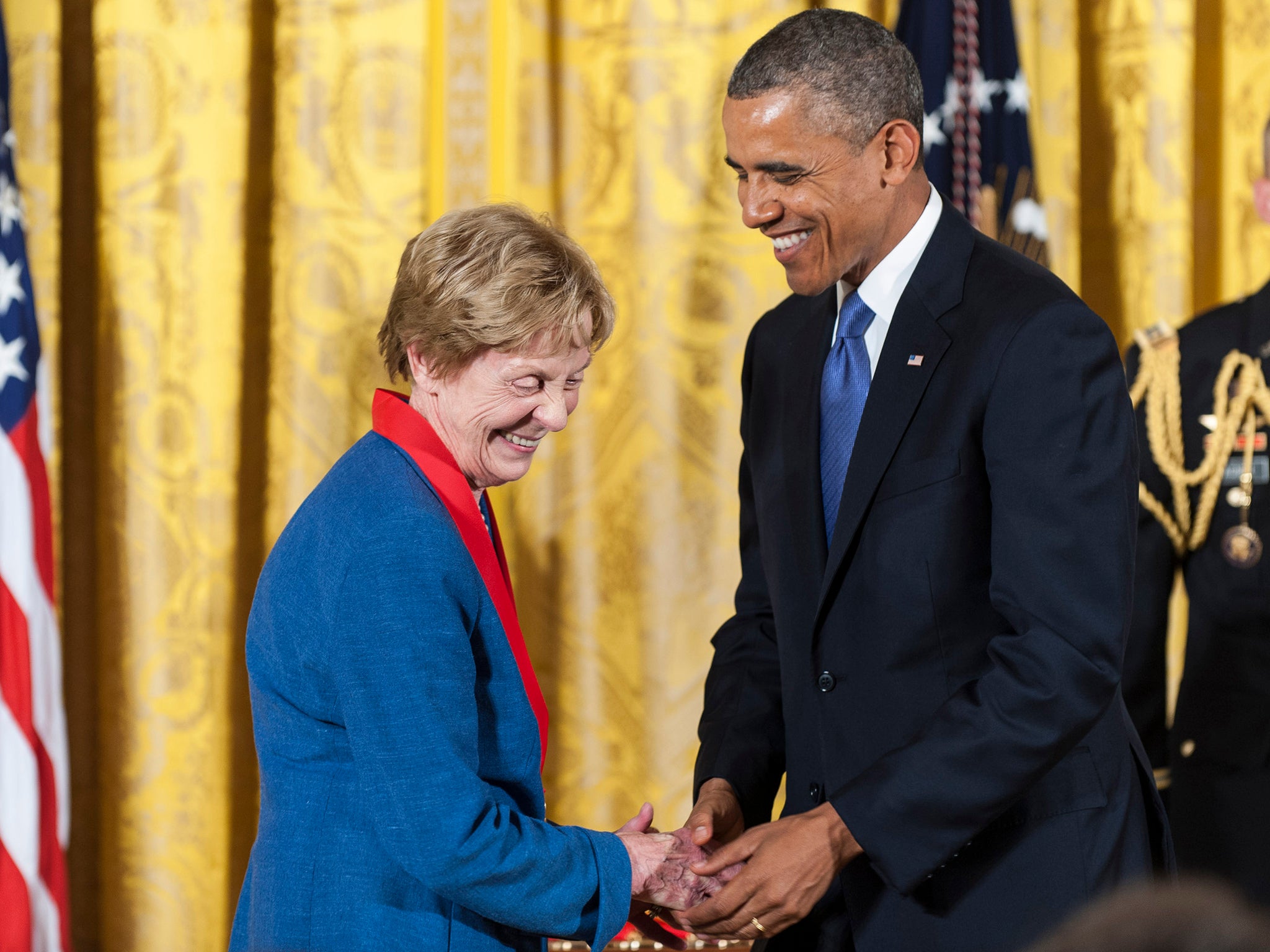Jill Ker Conway: trailblazing feminist historian and Smith College president
In her decade-long tenure, she presided over a transformation that brought the women’s movement to a school dominated for more than a century by a conservative male faculty

Your support helps us to tell the story
From reproductive rights to climate change to Big Tech, The Independent is on the ground when the story is developing. Whether it's investigating the financials of Elon Musk's pro-Trump PAC or producing our latest documentary, 'The A Word', which shines a light on the American women fighting for reproductive rights, we know how important it is to parse out the facts from the messaging.
At such a critical moment in US history, we need reporters on the ground. Your donation allows us to keep sending journalists to speak to both sides of the story.
The Independent is trusted by Americans across the entire political spectrum. And unlike many other quality news outlets, we choose not to lock Americans out of our reporting and analysis with paywalls. We believe quality journalism should be available to everyone, paid for by those who can afford it.
Your support makes all the difference.Jill Ker Conway, who has died aged 83, chronicled the role of women in American society and then made history of her own, serving as the first female president of Smith College, the all-female Ivy League school in Northampton, Massachusetts. She was also one of the first female board members of several major corporations.
Australian-born Conway was just 40 when, in 1975, she became the first woman to lead Smith, America’s largest liberal arts institution for women. In her decade-long tenure, she presided over a transformation that brought the women’s movement to a school dominated for more than a century by conservative male faculty and administrators.
“Jill Ker Conway came to Smith at a time when gender roles were being transformed – and there were people here who tried to stand in her way,” Kathleen McCartney, Smith’s current president, said. “But at a time when the academy didn’t see women as college presidents – or as leaders at all – she demonstrated a leadership that was innovative and effective.”
While Conway paved the way for women such as Judith Rodin, who in 1993 was named the first female president of an Ivy League school (the University of Pennsylvania), women remain underrepresented at the highest levels of academia. A 2017 study by the American Council on Education found they hold just 30 per cent of the top jobs at colleges and universities.
In a wide-ranging career, Conway was an accomplished scholar who focused on early 20th century women’s reformers but later wrote a trio of critically acclaimed memoirs, beginning with The Road From Coorain (1989). New York Times reviewer Verlyn Klinkenborg described it as “the work of a writer who relentlessly tugs at the cultural fences around her until they collapse, leaving her solitary under an immense Australian sky, enlarged to herself at last”.
The book chronicled her upbringing on a 32,000-acre sheep station and, after finishing in the top of her class at the University of Sydney, the sexism she faced while trying to land a job with the Australian foreign service.
In reports on her application, diplomatic officials noted that she was “too good looking” and “too intellectually aggressive”, would “be married within a year” and “never do for diplomacy”.
She spent much of her career fighting to ensure that other women faced better treatment, whether in diplomacy, law, science or the arts.
Inspired by reformers such as Jane Addams, the famed Chicago social worker and suffrage advocate, Conway campaigned for equal pay as a professor at the University of Toronto, an effort that caught the attention of the Ontario legislature and resulted in reforms to the school’s tenure and pay policies.
After being appointed the university’s first female vice president, she drew the attention of progressive trustees at Smith, where men made up three-quarters of the faculty.
While a state anti-discrimination commission had recently found the school guilty of sex discrimination against two women who were denied tenure, its graduates included path-breaking feminists Betty Friedan and Gloria Steinem, whose push for gender equality helped unleash a social revolution.
“When Jill was appointed it absolutely electrified the campus,” Susan C Bourque, a former provost and dean of the faculty at Smith, said. “Here was this vibrant young woman, enormously attractive, who had just been appointed as the first woman in Smith’s history. You could just feel the new history that had come.”
Soon after her appointment, Conway was recognised by Time magazine as one of its “women of the year”, alongside figures such as first lady Betty Ford, housing and urban development secretary Carla Hills and tennis player Billie Jean King.
“America has not entirely repealed the Code of Hammurabi (woman as male property),” the magazine wrote in an accompanying cover story, “but enough US women have so deliberately taken possession of their lives that the event is spiritually equivalent to the discovery of a new continent.”
Conway, for her part, called for a focus on “research and the creation of new knowledge around matters of central importance in women’s lives”.
She spearheaded the creation of programmes in women’s studies, engineering and business, pressing for coursework that would prepare women for professional careers long considered the exclusive province of men.
She also developed policies aimed at promoting women to senior positions in the faculty, expanded athletic facilities and oversaw the creation of a scholarship programme for women pursuing a college education at non-traditional ages, often after having children.
Her efforts were driven by an explosive growth in the school’s endowment, which according to Smith nearly tripled to $222m (£167m) from $82m, but accompanied by fraught relations with the school’s old guard, a group that called itself “the Dinosaurs”, according to Bourque.
“The whole structure of higher education for women was built without any attempt to relate the educated person to the occupational structure of society outside,” Conway told the New York Times in 1975, effectively summarising her opposition. “That’s why the whole first generation of educated women,” the subject of her PhD dissertation, “had nervous collapses.”
“We have to change the perception of employers that women have certain kinds of skill,” she added, “and something must be done to make women realise what skills they have.”

Jill Kathryn Ker was born in Hillston, in the Australian state of New South Wales. She was 10 when her father drowned, working on the sheep farm’s water system amid a years-long drought, and she was soon brought to Sydney by her mother.
The duo maintained a difficult relationship, which became further strained after Conway’s eldest brother died in a car accident. “My mother’s devotion to me,” she wrote in The Road From Coorain, “the self-denial which had sent her to work to educate me properly, her frequent references to the fact that I was her consolation for her past tragedies, weighed on me like the Ancient Mariner’s albatross.”
In part, Conway said, she was driven to study history as a means of understanding her mother and the social forces that shaped her life. Initially, however, she responded to her rejection from the foreign service by doing “the most frivolous thing” – coming to London to study modelling.
She soon dropped out and moved to the US, where she received a doctorate in history from Harvard University in 1969.
It was there that she met John J Conway, a history professor for whom she worked as a teaching assistant. They married in 1962, and each decade took turns deciding where to live. The agreement enabled both their careers to thrive: it was his turn when they moved to Toronto, and was hers when they came to Smith College.
He died in 1995, and Conway leaves no immediate survivors.
After retiring from Smith in 1985, seeking to make a career change, Conway served on the boards of businesses including Merrill Lynch, Nike, Colgate-Palmolive and Lendlease, a Sydney-based company where she served as chairman. She was also a former chairman of the American Antiquarian Society.
At the same time, Conway began publishing her memoirs, which continued with True North (1994) and A Woman’s Education (2001); edited a two-volume anthology of autobiographical excerpts by women, Written By Herself; and wrote a history and analysis of the autobiographical form, When Memory Speaks (1998).
She also worked as a visiting professor at the Massachusetts Institute of Technology, focusing on environmental issues, and was outspoken on the need for affordable housing for homeless veterans – an issue that came to her attention partly through her husband, who served in the Canadian infantry in the Second World War and whose right hand was blown off by a grenade. The John and Jill Ker Conway Residence, a Washington apartment building designed for homeless veterans, opened last year and is named in her honour.
In 2013, she was named a Companion of the Order of Australia, one of that country’s highest honours, and received the National Humanities Medal from President Barack Obama.
“Dr Conway has inspired generations of scholars,” the citation noted, “and her studies of exceptional and empowered women have revealed a common drive that unites women across the globe – to create, to lead and to excel.”
Jill Ker Conway, Australian-American author and scholar, born 9 October 1934, died 1 June 2018
© Washington Post
Join our commenting forum
Join thought-provoking conversations, follow other Independent readers and see their replies
Comments